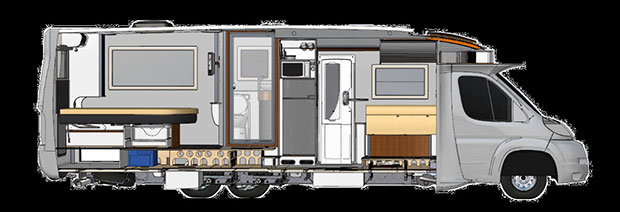
The 2018 edition of the SOLIDWORKS portfolio of 3D engineering applications has launched. Dassault reports that this release sees new tools and enhancements ranging from the user interface to improved sheet metal design tools and from integrated CAM to support for touch-enabled devices. Image courtesy of Dassault Systèmes SOLIDWORKS Corp.
Latest News
October 4, 2017
 Dear DE Reader:
Dear DE Reader:
There’s not enough space to list all the stuff rolling out in SOLIDWORKS 2018 in the next couple of weeks. And, apparently, there’s more to come. The website indicates that additional solutions for electrical CAD and that internet of things thing are on tap for a May rollout.
Anyway, SOLIDWORKS 2018 has new tools, features and enhancements throughout. And literally from the start: There’s a new welcome screen. Some of what you’ll find is integrated CAM, improved data management capabilities as well as interesting new features and functionality for working with sheet metal and simulations.
 The 2018 edition of the SOLIDWORKS portfolio of 3D engineering applications has launched. Dassault reports that this release sees new tools and enhancements ranging from the user interface to improved sheet metal design tools and from integrated CAM to support for touch-enabled devices. Image courtesy of Dassault Systèmes SOLIDWORKS Corp.
The 2018 edition of the SOLIDWORKS portfolio of 3D engineering applications has launched. Dassault reports that this release sees new tools and enhancements ranging from the user interface to improved sheet metal design tools and from integrated CAM to support for touch-enabled devices. Image courtesy of Dassault Systèmes SOLIDWORKS Corp.On the user interface side, there’s new support for pen- and touch-enabled devices. You can now do touch sketching. Even customizing mouse gestures has been made easier, and SOLIDWORKS will now send you an email to let you know your simulation run is complete.
Down in the granular details, SOLIDWORKS 2018 introduces capabilities for working with assemblies like Adding Mates Between Hidden Surfaces. There’s a new Tab and Slot feature for sheet metal design. You’ll see simulation mesh refinements, and you can now create inspection documentation directly from 3D models with PMI (production manufacturing information). It’s easier to offload rendering unto another workstation to free up yours. And on it goes.
Still, it’s probably CAM integration that’s the biggest thing. It’s called SOLIDWORKS CAM, and it’s a new application inside of SOLIDWORKS 2018 that provides rules-based machining with knowledge capture, enabling manufacturing programming automation. It leverages CAMWorks technology, which is pretty interesting software in its own right.
On a workflow level, this integration means that SOLIDWORKS 2018 creates an integrated approach to get your products from design to manufacturing by putting the part and assembly model in the center of the action. So you’re talking about design or manufacturing alterations and related data well managed and flowing to stakeholders, concurrent collaboration becomes inherent and so on.
On a hands-on level, SOLIDWORKS CAM has part and assembly machining, 2.5-axis milling and two-axis turning. It sounds like it could make CNC (computer numerical control) programming far less time-consuming and complex.
Haven’t even scratched the surface. So, what you do is this: Hit today’s Editor’s Pick of the Week, read up about SOLIDWORKS 2018 a bit and watch some videos. Then find your local SOLIDWORKS dealer’s launch event from the link at the end of the main write-up and go see it first hand.
Thanks, Pal. — Lockwood
Anthony J. Lockwood
Editor at Large, DE
Subscribe to our FREE magazine, FREE email newsletters or both!
Latest News
About the Author
Anthony J. Lockwood is Digital Engineering’s founding editor. He is now retired. Contact him via [email protected].
Follow DE





